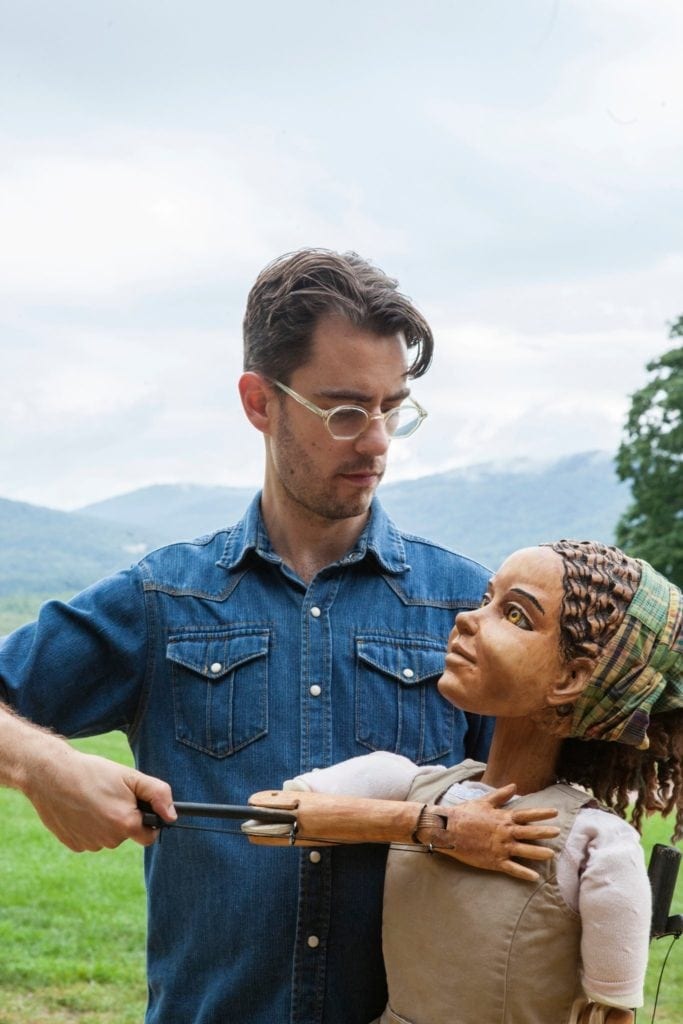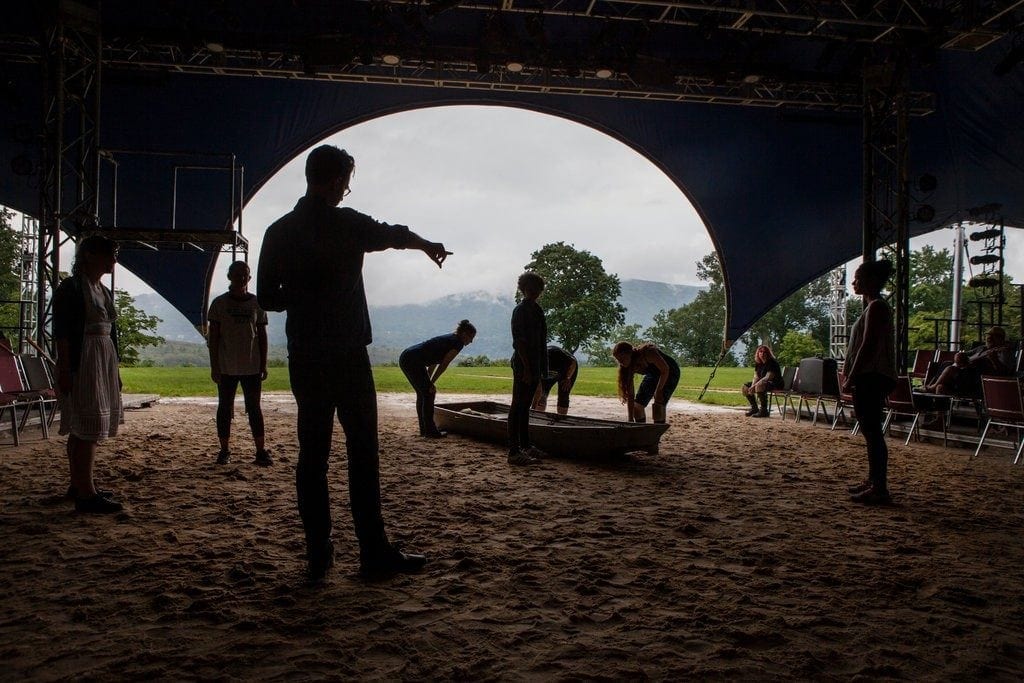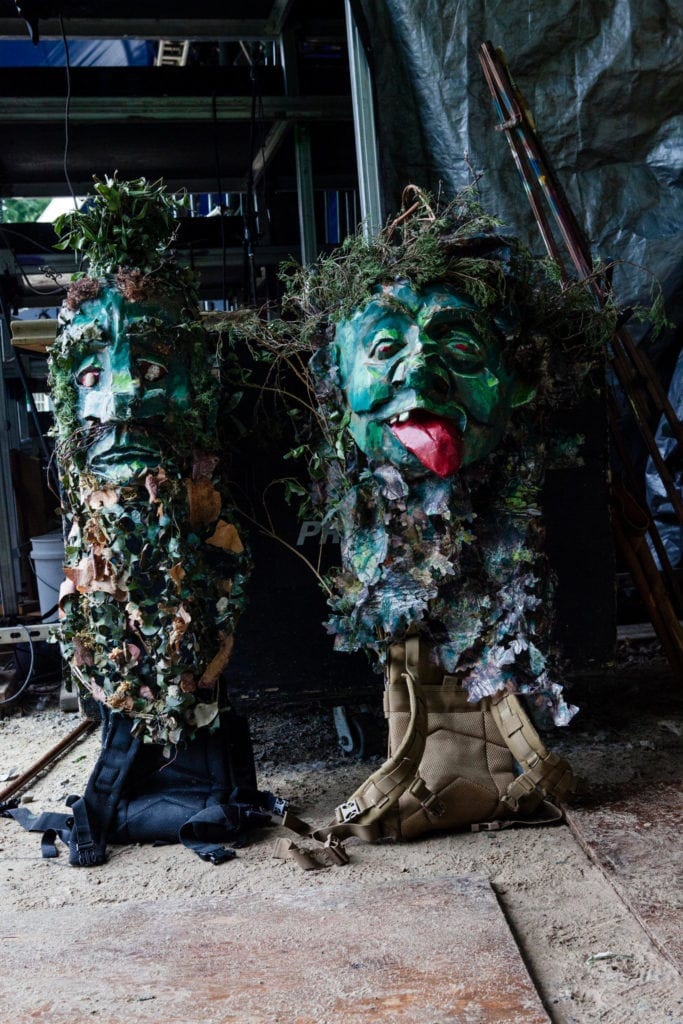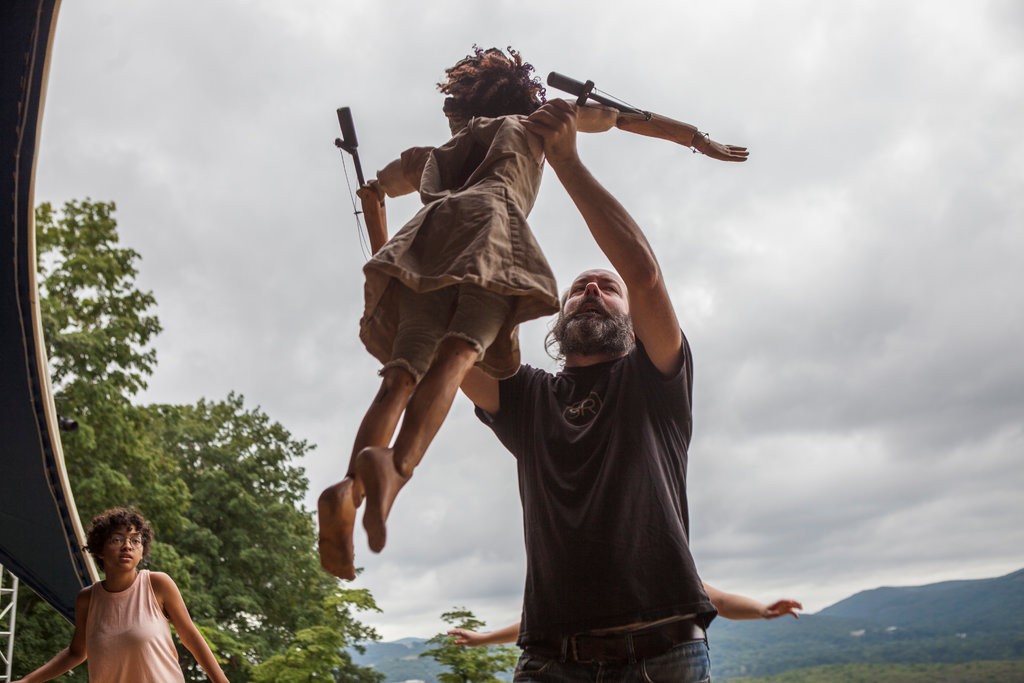Posted August 22, 2018
![]() Originally published on August 21, 2018 by Jennifer Schuessler in The New York Times (“Rip Van Winkle, Newly Awake, Meets His Neighbors Onstage”).
Originally published on August 21, 2018 by Jennifer Schuessler in The New York Times (“Rip Van Winkle, Newly Awake, Meets His Neighbors Onstage”).
Two hundred years ago this summer, Washington Irving sat down one night and poured out the tale of an 18th-century Hudson Valley layabout who wandered up into the Catskill Mountains, drank some magical cider and fell asleep for 20 years, only to wake up and find himself in a brand-new country called the United States.
That story, “Rip Van Winkle,” along with other tall tales like “The Legend of Sleepy Hollow,” helped establish Irving’s claim to being the first genuinely American author, a founder of a tradition marked by folksy vernacular, rapturous paeans to nature and a stretched relationship to the truth.
But on a recent weekend, about three dozen people were standing in a rehearsal space a stone’s throw from the Hudson paying homage to one of his lesser-known contributions to our national culture: perhaps the earliest known use of the word “doughnut.”
“Doough-nut, doough-nut,” they sang in a low, slightly queasy drone that was half sea-shanty, half yoga warm-up, as a five-piece band warmed up in the background. “Dooooough-nut!”
The group was rehearsing a song from “Rip Van Winkle or, Cut the Old Moon Into Stars,” a new adaptation of Irving’s story, which will run over Labor Day weekend in the tent at the Hudson Valley Shakespeare in Garrison, N.Y., against the same spectacular landscape that inspired Irving.
Every show at the festival, where audience members are invited to picnic on the lawn beforehand, has the feeling of a celebratory summer feast. But “Rip Van Winkle” will be a distinctly locavore event.
The cast of 43 actors and musicians are mostly amateurs drawn from the surrounding communities. Virtually all the oars, beer steins, chairs, farm implements and other props were borrowed from area basements and attics, while six of the seven life-size puppets that supplement the cast were built by local volunteers.

And yes, there will be doughnuts and (non-magical) Hudson Valley cider, along with preshow games of ninepin bowling, in homage to the sport played in Irving’s story, which is set in a fantasy version of a village in colonial Dutch New York.
“This is a play, but also a communal storytelling event,” Seth Bockley, the piece’s writer and director, said in an interview. “This is an old story retold in a new way by the community that lives in this place now.”
It’s also an attempt to dust the moss off a work that’s far richer and weirder than the quaint period piece many might dimly recall from a long-ago school assignment.
“When I started out, I had some vague idea of a guy who woke up with a long beard,” Mr. Bockley, 36, recalled. “But this is really a story about getting lost, finding home, and the strangeness of time.”
If Irving’s story goes back to 1818, the play’s origin story dates to 2014, when Davis McCallum, the festival’s newly arrived artistic director, saw a production of “The Winter’s Tale” staged by Public Works, a project of the Public Theater that draws on community performers to mount musical stagings of Shakespeare at the Delacorte Theater in Central Park.
“I came back thinking I had never seen anything like it,” Mr. McCallum said. “I wondered if we could do a similar kind of radically participatory theater here.”
In 2016, the festival staged “Our Town” with a cast of mainly community members. Mr. McCallum then decided to produce an original play — the festival’s first main stage commission — based on a local source.

“Rip Van Winkle” was one of the most performed works of the 19th-century stage, thanks to an 1865 adaptation by Dion Boucicault and the actor Joseph Jefferson, who played the title role for more than 40 years. To create a 21st-century version, Mr. McCallum turned to Mr. Bockley, whose résumé includes ambitious literary adaptations like a nearly six-hour staging of Roberto Bolaño’s novel “2666” and various site-specific spectacles with the Chicago company Redmoon.
Mr. Bockley, who is based in St. Paul, said his creative gears really started turning when he dug into Irving’s satirical 1809 “History of New York” (which includes that reference to “doughnut,” for the record), and the Nabokov-like series of hoax advertisements he created to promote it, which attributed the book to a (fictional) Dutch historian named Diedrich Knickerbocker.
“Irving was really messing with people in a way I really love,” Mr. Bockley said. “He was both writing a false history, and creating a kind of political and social commentary.”
Mr. Bockley’s “Rip” mixes homespun sweetness with a gently postmodern collage aesthetic. There are elegiac songs about nature and the passage of time (scored by Raymond Bokhour) and gently comic digressions from the main story, drawn from Irving’s other writing.
There are also lines lifted directly from Boucicault, and winking cameos by Irving, Knickerbocker and the future 93-year-old “author,” meaning Mr. Bockley himself (played by a 12-year-old boy).
But the overall mood is one of gentle melancholy. During the rehearsal, cast members watched as three young women maneuvered a delicately carved wooden puppet representing Rip’s 4-year-old daughter Sara, into the arms of her mother, Geertje (played by Robyn Kerr, one of four professional actors).
Jesse Mooney-Bullock, an Ohio-based artisan, created the Sara puppet. But the puppets representing the ghosts of the explorer Hendrick Hudson and his crew (who provide Rip that sleep-inducing cider) were made from salvaged materials at “community build” sessions at Safe Harbors, a nonprofit community arts and housing organization in Newburgh, N.Y.

The cast was similarly gathered from 15 towns across the valley through a series of storytelling workshops and auditions, and reflects the changing demographics of a region where gentrification, immigration and inequality are hotly debated.
Two of the puppets will be operated by Yudy Gomez and Roger Acevedo, professional clown performers from Bogotá, Colombia, now living in Newburgh, a faded industrial city upriver from the festival’s grounds.
The role of Doolittle, a carpetbagging politician, is played by Alison Anthoine, a transplant from Manhattan who ran for mayor of Cold Spring last year.
“I lost by 23 votes,” Ms. Anthoine, a lawyer, said with a laugh. “It’s much easier to play a politician.”
The Dutch New York of Irving’s tale was a nostalgic fantasy even when he wrote it. But some potential props brought by cast members, piled up in a rummage-sale-like drift in the corner, carried whiffs of the old ghosts.
Sally Sirota, a doctor from Cornwall, pointed out a paddle her father had gotten from an old Dutch sailor who had settled in the area after World War II. His name was still faintly visible in marker: Petraeus. (He was Sixtus Petraeus, the father of Gen. David H. Petraeus.)
To Mr. Bockley, it represents just another one of the stories — big and small, old and new, real and made-up — gathered in the play.
“I want the show to celebrate and get lost in this kaleidoscope of stories that come out of this special place,” he said.


